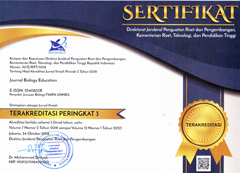E-Module of Human Circulatory System through Levels of Inquiry-Based to Improve Students' Science Literacy
Abstract
This study aims to analyze the E-module validity and practicality of the human circulatory system through levels of inquiry based to improve the students' science literacy. It used Research and Development model with the stages of research, including needs analysis, product design, prototyping, validation, testing, and revision. Validation sheets, observation sheets of learning implementation, student response questionnaire, and the science literacy tests were used in data collection techniques. The validity test results showed that this e-module is included in the very valid criteria with an average presentation value of 96% validity. The practical test results show that this is the very practical criteria of e-module with an average presentation of teacher activity implementation of 83,3%, while the average presentation of student activity implementation of 79,17%, and the value of student response of 83,96%. The effectiveness test used one group pretest-posttest design which obtained the average pretest value of 34,2 and the average post-test value of 70,83. There is an increase in the ability of students' science literacy with an n-gain of 0,56 (medium category). Based on the results of the study, it is found that the e-module of the human circulatory system based on levels of inquiry is valid, practical, and effective to be used in improving students ' science literacy.
The copyright of the article once it is accepted for publication shall be assigned to the journal as the publisher. The intended copyright includes the right to publish the article in various forms (including reprints). The journal maintains the publishing rights to the published articles.
This work is licensed under a Creative Commons Attribution 4.0 International License.







